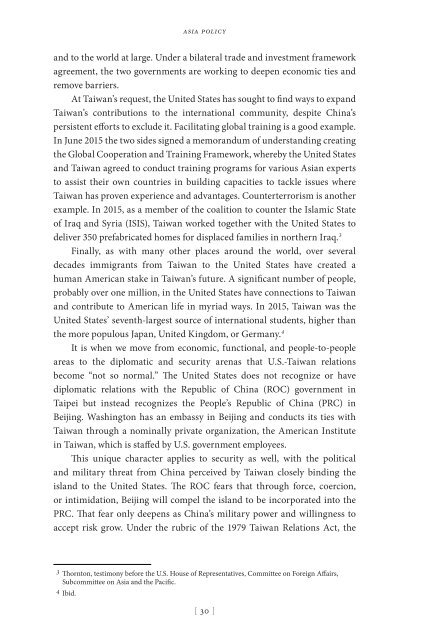2jBVKVf
2jBVKVf
2jBVKVf
You also want an ePaper? Increase the reach of your titles
YUMPU automatically turns print PDFs into web optimized ePapers that Google loves.
asia policy<br />
and to the world at large. Under a bilateral trade and investment framework<br />
agreement, the two governments are working to deepen economic ties and<br />
remove barriers.<br />
At Taiwan’s request, the United States has sought to find ways to expand<br />
Taiwan’s contributions to the international community, despite China’s<br />
persistent efforts to exclude it. Facilitating global training is a good example.<br />
In June 2015 the two sides signed a memorandum of understanding creating<br />
the Global Cooperation and Training Framework, whereby the United States<br />
and Taiwan agreed to conduct training programs for various Asian experts<br />
to assist their own countries in building capacities to tackle issues where<br />
Taiwan has proven experience and advantages. Counterterrorism is another<br />
example. In 2015, as a member of the coalition to counter the Islamic State<br />
of Iraq and Syria (ISIS), Taiwan worked together with the United States to<br />
deliver 350 prefabricated homes for displaced families in northern Iraq. 3<br />
Finally, as with many other places around the world, over several<br />
decades immigrants from Taiwan to the United States have created a<br />
human American stake in Taiwan’s future. A significant number of people,<br />
probably over one million, in the United States have connections to Taiwan<br />
and contribute to American life in myriad ways. In 2015, Taiwan was the<br />
United States’ seventh-largest source of international students, higher than<br />
the more populous Japan, United Kingdom, or Germany. 4<br />
It is when we move from economic, functional, and people-to-people<br />
areas to the diplomatic and security arenas that U.S.-Taiwan relations<br />
become “not so normal.” The United States does not recognize or have<br />
diplomatic relations with the Republic of China (ROC) government in<br />
Taipei but instead recognizes the People’s Republic of China (PRC) in<br />
Beijing. Washington has an embassy in Beijing and conducts its ties with<br />
Taiwan through a nominally private organization, the American Institute<br />
in Taiwan, which is staffed by U.S. government employees.<br />
This unique character applies to security as well, with the political<br />
and military threat from China perceived by Taiwan closely binding the<br />
island to the United States. The ROC fears that through force, coercion,<br />
or intimidation, Beijing will compel the island to be incorporated into the<br />
PRC. That fear only deepens as China’s military power and willingness to<br />
accept risk grow. Under the rubric of the 1979 Taiwan Relations Act, the<br />
3 Thornton, testimony before the U.S. House of Representatives, Committee on Foreign Affairs,<br />
Subcommittee on Asia and the Pacific.<br />
4 Ibid.<br />
[ 30 ]


